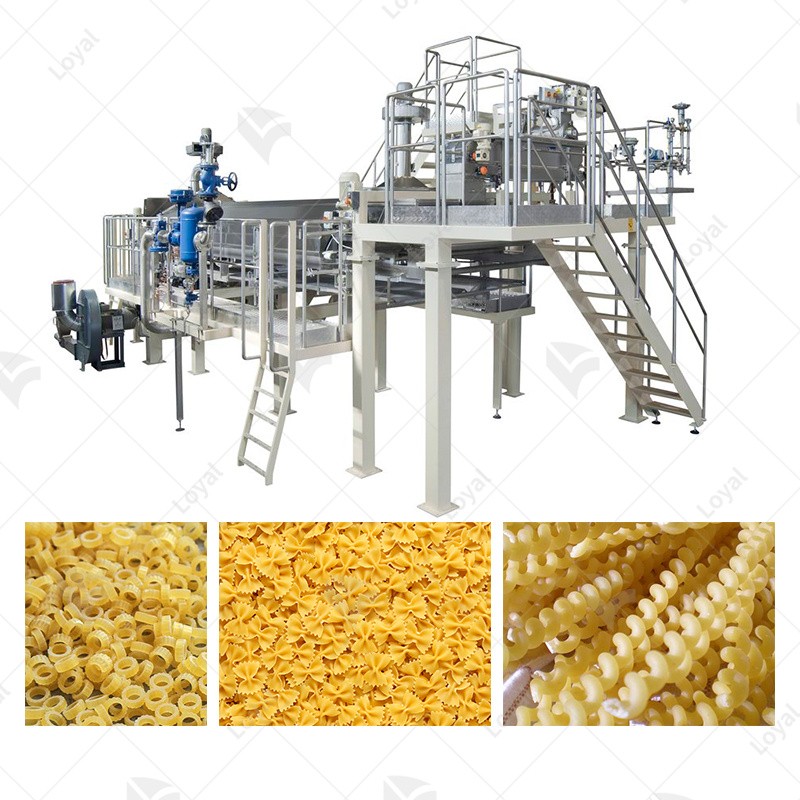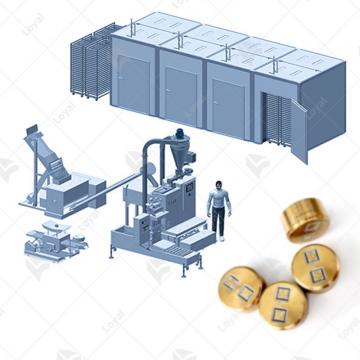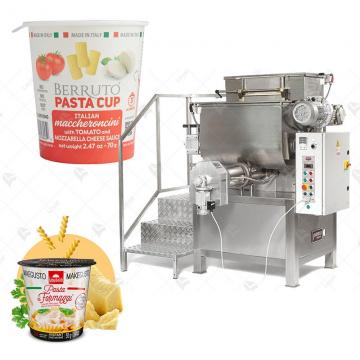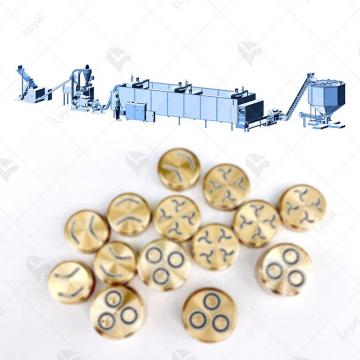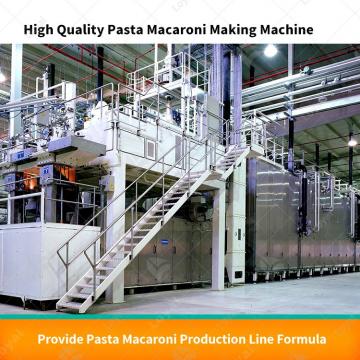Precision in Pasta: Fully Automated and Energy-Efficient Dry Pasta Production Lines
Precision in Pasta: Fully Automated and Energy-Efficient Dry Pasta Production Lines
The evolution of pasta manufacturing has witnessed a remarkable transformation with the advent of fully automated and energy-efficient dry pasta production lines. In this era of precision in pasta production, the integration of advanced technologies has become synonymous with achieving consistent product quality and operational excellence.Shandong Loyal Industrial Co., Ltd. has incorporated advanced technologies from Capitanio and HEMAKS in the production of its macaroni.
The historical overview of pasta production methods reveals a journey marked by traditional techniques. The emergence of fully automated and energy-efficient dry pasta production lines signifies a groundbreaking shift in the industry's landscape. Today, precision is at the forefront of modern pasta manufacturing, setting new standards for efficiency and quality.
Precision plays a pivotal role in ensuring the consistency of pasta products. As consumer expectations rise, the need for precise control over every aspect of the production process becomes paramount. Automation emerges as a key enabler, providing the necessary tools to achieve the desired level of precision in contemporary pasta manufacturing.

Technological Advances in Dry Pasta Production Lines
Fully automated dry pasta production lines represent the pinnacle of technological innovation in the industry. These systems encompass a range of components and features designed to enhance precision and efficiency. From ingredient mixing to packaging, automation ensures a seamless and controlled process, minimizing variability and maximizing output.
The integration of energy-efficient technologies is a crucial aspect of modern dry pasta production lines. Sustainability is no longer a secondary consideration but a fundamental principle. The incorporation of eco-friendly practices and energy-efficient technologies aligns with the industry's commitment to responsible manufacturing.
Operational Efficiency and Product Consistency
Fully automated systems optimize operational processes in ways that were previously unimaginable. Production speed reaches new heights, waste is significantly reduced, and overall efficiency is maximized. Precision in every step ensures that the pasta production line operates at the peak of its capabilities.
Precision and automation go hand in hand to guarantee consistent product quality. Whether it's the measurement and mixing of ingredients or the control of cooking parameters, automation minimizes variations across batches. This level of consistency contributes to heightened consumer satisfaction and brand loyalty.
Case Studies: Successful Implementation and Results
Numerous companies, including esteemed brands like San Giorgio and Great Value, have successfully implemented fully automated and energy-efficient dry pasta production lines. Case studies abound with examples of precision leading to operational benefits, including increased speed, reduced costs, and improved product quality.
The impact of precision in pasta production extends beyond individual companies to shape the entire industry. As more manufacturers adopt these technologies, innovations continue to emerge. Ongoing advancements promise even higher levels of precision, solidifying the industry's commitment to excellence.

Future Trends and Sustainability
The future holds exciting prospects with emerging technologies poised to redefine dry pasta production. From real-time monitoring to adaptive control systems, these technologies promise to elevate precision to unprecedented levels.
Sustainability is not just a trend but a necessity in the evolving landscape of dry pasta production. Energy-efficient technologies, coupled with sustainable practices, contribute to environmental responsibility. The pursuit of a greener future is integral to the industry's commitment to sustainability.
Conclusion
In conclusion, the journey towards precision in pasta production through fully automated and energy-efficient dry pasta production lines reflects the industry's commitment to excellence. The seamless integration of advanced technologies ensures operational efficiency, consistent product quality, and a sustainable future for pasta manufacturing.
As we delve into the frequently asked questions about dry pasta production lines, we aim to provide clarity on essential aspects that pique the interest of industry enthusiasts, manufacturers, and consumers alike.

FAQs: Frequently Asked Questions about Dry Pasta Production Lines
Q1: How do fully automated systems contribute to precision in dry pasta production?
A: Fully automated systems employ cutting-edge technologies to control and monitor every stage of the production process. This level of control minimizes variations, ensuring precise measurements, mixing, and cooking parameters. Automation plays a pivotal role in achieving consistency in product quality.
Q2: Can energy-efficient technologies enhance sustainability in pasta manufacturing?
A: Absolutely. The integration of energy-efficient technologies in dry pasta production lines aligns with sustainability goals. Reduced energy consumption, waste minimization, and eco-friendly practices contribute to a more sustainable and environmentally responsible approach to pasta manufacturing.
Q3: What real-world results have been observed in companies implementing these technologies, including San Giorgio and Great Value?
A: Case studies of companies, such as San Giorgio and Great Value, showcase tangible results from implementing fully automated and energy-efficient dry pasta production lines. These results include increased production speed, reduced operational costs, and improved product quality, all contributing to enhanced overall efficiency.
Q4: How does precision impact consumer satisfaction and brand loyalty?
A: Precision in pasta production ensures consistent quality across batches, meeting and exceeding consumer expectations. The reliability of product quality enhances consumer satisfaction, leading to increased brand loyalty. Consumers are more likely to choose brands that consistently deliver high-quality products.
Q5: What are the anticipated innovations in the future of dry pasta production?
A: The future holds promising innovations, with emerging technologies expected to redefine dry pasta production. Real-time monitoring, adaptive control systems, and advancements in processing techniques are among the anticipated innovations that will further elevate precision and efficiency in the industry.
Q6: How does the industry as a whole benefit from the widespread adoption of precision in pasta production?
A: The industry benefits collectively as precision becomes a standard in pasta production. The widespread adoption of advanced technologies contributes to a more competitive and innovative landscape. Collaborative efforts drive continuous improvements, fostering an environment of excellence and advancement

